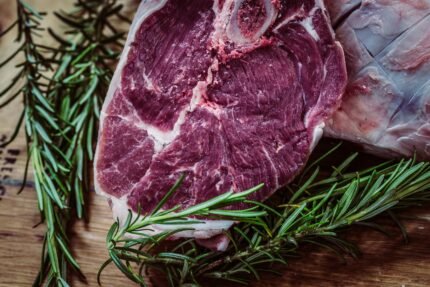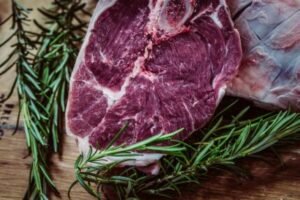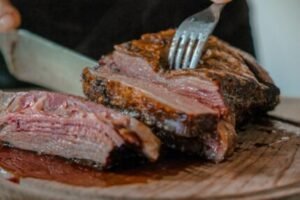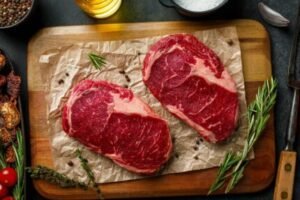Medically reviewed by Dr. Ramesh Gaddam, M.D. — Written by Sumalatha, D.N.H.E
Table of Contents
ToggleHave you ever wondered if the steak on your plate contains hidden carbs? Many people assume that all foods contain at least some carbohydrates, but this isn’t always true.
Understanding the nutritional makeup of what we eat is crucial, especially for those following specific dietary plans.
In this post, we’ll learn about the nutritional composition of meat, examining whether it has any carbohydrate content and what that means for your diet.
1. What Are Carbohydrates?
Carbohydrates are one of the main nutrients our body needs to function. They provide us with energy, which is especially important for our muscles and brain.
Carbohydrates are found in many foods, including fruits, vegetables, bread, and sweets.
2. Types of Carbs
- Sugars: These are simple carbs found in fruits, milk, and sweets. They provide quick energy.
- Starches: These are complex carbs found in foods like bread, pasta, and potatoes. They give us energy more slowly than sugars.
- Fibers: These are also complex carbs but aren’t digested by our body. They help keep our digestive system healthy.
3. Nutritional Composition of Meat
Macronutrients in Meat
Meat is a rich source of essential nutrients, primarily providing proteins and fats. Proteins are crucial for building and repairing tissues, supporting muscle growth, and maintaining a healthy immune system.
Fats in meat, including saturated and unsaturated fats, provide long-lasting energy and aid in the absorption of fat-soluble vitamins.
Carbohydrate Content
Meat generally contains little to no carbohydrates. Most fresh, unprocessed meats like beef, chicken, and pork have virtually zero carbs, making them a key component of low-carb diets.
Nutritional profile of meat (fresh, unprocessed meat)
| Nutrient | Beef (100g) | Chicken (100g) | Pork (100g) | Lamb (100g) |
|---|---|---|---|---|
| Calories | 250 kcal | 165 kcal | 242 kcal | 294 kcal |
| Protein | 26 g | 31 g | 27 g | 25 g |
| Fat | 20 g | 3.6 g | 20 g | 23 g |
| Saturated Fat | 8 g | 1 g | 7 g | 9 g |
| Monounsaturated Fat | 9 g | 1.2 g | 8 g | 10 g |
| Polyunsaturated Fat | 0.8 g | 0.8 g | 0.8 g | 1 g |
| Cholesterol | 90 mg | 85 mg | 80 mg | 97 mg |
| Carbohydrates | 0 g | 0 g | 0 g | 0 g |
| Fiber | 0 g | 0 g | 0 g | 0 g |
| Sugars | 0 g | 0 g | 0 g | 0 g |
4. Types of Meat and Their Carbohydrate Content
Red Meat (Beef, Lamb, Pork)
Red meats like beef, lamb, and pork typically contain zero carbohydrates. These meats are rich in protein and fats, making them ideal for those following low-carb diets.
Poultry (Chicken, Turkey)
Poultry, including chicken and turkey, also generally contains no carbohydrates.
These meats are lean sources of protein and are popular choices for health-conscious individuals and those managing their carbohydrate intake.
Processed Meats
Processed meats, such as sausages, hot dogs, and deli meats, can contain small amounts of carbohydrates.
This is usually due to added ingredients like fillers, sugars, and preservatives. Always check the nutritional labels of processed meats to be aware of any added carbs.
5. Why Does Meat Contain No Carbohydrates?
Meat contains no carbohydrates because it is composed primarily of muscle tissue, which is made up of proteins and fats.
Carbohydrates are typically found in plant-based foods where they serve as energy storage in the form of sugars, starches, and fibers.
Here are a few key reasons why meat is carb-free:
Muscle Tissue Composition
- Proteins: The primary component of meat is protein, which is essential for building and repairing tissues in animals and humans.
- Fats: Meat also contains varying amounts of fat, which serves as a dense energy source and aids in the absorption of fat-soluble vitamins.
Energy Storage in Animals
While animals do store carbohydrates in the form of glycogen, this is primarily found in the liver and muscles in small amounts.
By the time meat reaches the consumer, any glycogen is largely depleted or present in negligible amounts.
Lack of Plant-Based Components
Carbohydrates in plants serve as structural components (like cellulose) or energy storage (like starch).
Since meat comes from animals, it naturally lacks these plant-based carbohydrate structures.
Therefore, the nutritional composition of meat focuses on providing protein and fat, with little to no carbohydrates. This makes meat a staple in low-carb and high-protein diets.
6. Why Some Meat Products Might Have Carbs?
Marinades and Sauces
When meat is prepared with marinades or sauces, carbohydrates can be introduced.
Many marinades and sauces contain sugar, honey, or other sweeteners to enhance flavor, which adds to the carb content.
For example, barbecue sauce, teriyaki sauce, and some salad dressings can significantly increase the carbohydrate content of the meat.
Fillers and Additives
Processed meats, like sausages, hot dogs, and deli meats, often contain fillers and additives.
These ingredients, such as bread crumbs, starches, and sugars, are added to improve texture, flavor, and shelf life.
As a result, processed meats can have higher carbohydrate content compared to fresh, unprocessed meat.
Always check the ingredient list and nutritional information to be aware of added carbs in these products.
7. Health Considerations
Low-Carb Diets
Meat plays a crucial role in low-carb diets like Keto and Atkins.
These diets emphasize high protein and fat intake while minimizing carbohydrate consumption.
Since meat is naturally low in carbs and rich in proteins and fats, it is a staple for those looking to enter or maintain a state of ketosis, where the body burns fat for energy instead of carbs.
Balanced Diet
While low-carb diets can be effective for weight loss and certain health conditions, it’s important to maintain a balanced diet. A healthy diet includes a variety of foods to ensure you get all the necessary nutrients.
Understanding the composition of your food, including meat, helps you make informed choices.
Balancing meat with vegetables, fruits, grains, and healthy fats contributes to overall well-being and long-term health.
8. Frequently Asked Questions (FAQs)
What Food Has No Carbs?
Many foods have little to no carbohydrates, making them ideal for low-carb diets.
These include most types of meat, fish, eggs, and certain oils.
Vegetables like spinach, kale, and broccoli are also very low in carbs. These foods can help maintain a low-carb intake while providing essential nutrients.
Is Meat High in Carbs?
No, meat is not high in carbs. Fresh, unprocessed meats like beef, pork, lamb, chicken, and turkey contain virtually no carbohydrates.
They are primarily composed of proteins and fats, making them suitable for low-carb diets.
Is All Meat Carb Free?
Most fresh, unprocessed meat is carb-free. However, some processed meats may contain small amounts of carbs due to added fillers, sugars, or preservatives.
Always check the nutritional labels to ensure you are aware of any additional carbohydrate content.
Is Chicken High in Carbs?
No, chicken is not high in carbs. Fresh, unprocessed chicken contains no carbohydrates. It is an excellent source of lean protein and is widely used in low-carb and high-protein diets.
What Is the Healthiest Carb?
The healthiest carbohydrates are those that are minimally processed and high in fiber.
Examples include whole grains like quinoa, brown rice, and oats, as well as fruits, vegetables, and legumes.
These carbs provide sustained energy and essential nutrients.
What Are the Carb Foods to Avoid?
To maintain a low-carb diet, it’s best to avoid foods high in refined sugars and processed grains.
These include sugary snacks, candy, soda, white bread, pastries, and many breakfast cereals.
These foods can cause spikes in blood sugar levels and provide little nutritional value.
What Are the Top 5 Worst Carbs?
- Sugary Drinks: Sodas and sweetened beverages are high in empty calories and sugar.
- Candy and Sweets: These provide quick energy but lack essential nutrients.
- White Bread and Pasta: Highly processed and stripped of beneficial fibers and nutrients.
- Pastries and Cakes: Often high in sugar and refined flour.
- Chips and Crackers: Processed snacks that offer little nutritional value and are high in refined carbs.
What Are 3 Foods Low in Carbs?
- Eggs: High in protein and virtually no carbs.
- Avocados: Low in carbs and high in healthy fats.
- Leafy Greens: Spinach, kale, and other leafy greens are low in carbs and packed with nutrients.
Also Read:
Goat Meat (Chevon) Nutrition, Risks, Uses (10 Rich Benefits)
Medically reviewed by Dr. Ramesh Gaddam, M.D.

General Physician, Diabetologist, and Critical Care Specialist.
Related
Discover more from Health Build-Up
Subscribe to get the latest posts sent to your email.







